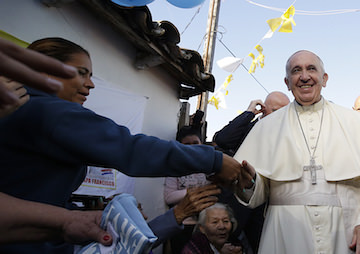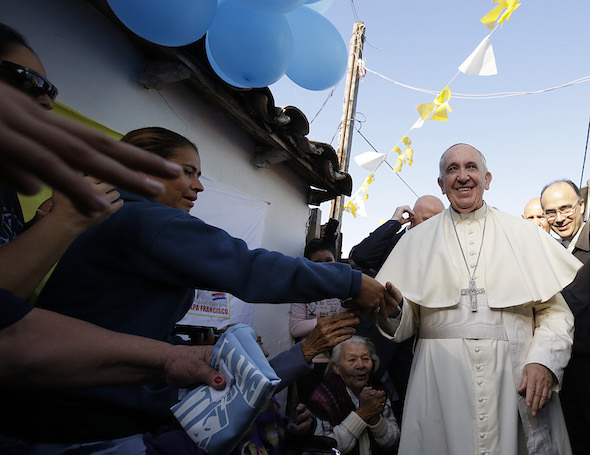In Paraguay, Pope Francis Continues Historic Critique of Global Capitalism
“The Argentine pope seemed to be asking for a social revolution,” wrote The New York Times on Friday as Pope Francis’ Latin American tour, featuring “left-leaning critiques" of "the inequalities of capitalism” and of "a ‘new colonialism’ rooted in an inequitable economic order,” approached its end.

Pope Francis is greeted during his visit to the Banado Norte neighborhood in Asuncion, Paraguay. (Gregorio Borgia / AP)
“The Argentine pope seemed to be asking for a social revolution,” wrote The New York Times on Friday as Pope Francis’ Latin American tour, featuring “left-leaning critiques” of “the inequalities of capitalism” and of “a ‘new colonialism’ rooted in an inequitable economic order,” approached its end.
Francis “does not simply argue that systemic ‘greed for money’ is a bad thing,” the Times continued. “He calls it a ‘subtle dictatorship’ that ‘condemns and enslaves men and women.’ “
Truthdig Editor-in-Chief Robert Scheer says Francis’ surging opposition to economic injustice has made him “the key educator worldwide on the failures of globalization.”
The pope’s Latin America trip follows the publication of his environmental encyclical, “Laudato Si,’ ” in June. In it, he called for radical action on the part of the world’s leaders and publics to take the necessary political and economic action to prevent the terminal deterioration of the world’s ecosystems — an event many scientists believe would kill enormous numbers of people.
In its article Friday, the Times quoted Stephen F. Schneck, director of the Institute for Policy Research and Catholic studies at Catholic University of America in Washington, as saying of the pope’s rhetoric: “This is not theology as usual; this is him shouting from the mountaintop.”
Francis’ public appearances included a speech in Santa Cruz, Bolivia, Wednesday night before an audience of nearly 2,000 social activists, farmers, trash workers and neighborhood activists. “Even as he meets regularly with heads of state,” the Times wrote, “Francis has often said that change must come from the grass roots, whether from poor people or the community organizers who work with them. To Francis, the poor have earned knowledge that is useful and redeeming, even as a ‘throwaway culture’ tosses them aside.”
In Bolivia, Francis praised cooperatives and other localized organizations that he said provide productive economies for the poor. “How different this is than the situation that results when those left behind by the formal market are exploited like slaves!” he said on Wednesday night. …
Francis’ primary agenda last week was to begin renewing Catholicism in Latin America and repositioning it as the church of the poor. His apology for the church’s complicity in the colonialist era received an immediate roar from the crowd. In various parts of Latin America, the association between the church and economic power elites remains intact. In Chile, a socially conservative country, some members of the country’s corporate elite are also members of Opus Dei, the traditionalist Catholic organization founded in Spain in 1928. …
Yet what remains unclear is whether Francis has a clear vision for a systemic alternative to the status quo that he and others criticize. “All these critiques point toward the incoherence of the simple idea of free market economics, but they don’t prescribe a remedy,” said Mr. Johnson, of the Institute for New Economic Thinking.
Francis acknowledged as much, conceding on Wednesday that he had no new “recipe” to quickly change the world. Instead, he spoke about a “process of change” undertaken at the grass-roots level.
Read more here.
— Posted by Alexander Reed Kelly.
Independent journalism is under threat and overshadowed by heavily funded mainstream media.
You can help level the playing field. Become a member.
Your tax-deductible contribution keeps us digging beneath the headlines to give you thought-provoking, investigative reporting and analysis that unearths what's really happening- without compromise.
Give today to support our courageous, independent journalists.






You need to be a supporter to comment.
There are currently no responses to this article.
Be the first to respond.